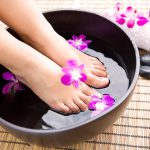Pure water is the world’s first and foremost medicine – Slovakian proverb
Did you know these water facts?
. Babies and children have the highest percentage of water.
. Adult men contain the next highest level of water.
. Adult women contain a lower percentage of water than babies or men.
. Obese men and women have less water, as a percentage than lean adults.
The amount of water in the human body ranges from 45-75 per cent. The average adult human body is 50-65 per cent water, averaging around 57-60 per cent. The percentage of water in infants is much higher, typically around 75-78 per cent water, dropping to 65 per cent by one year of age. The average adult male is about 60 per cent water. The average adult
woman is about 55 per cent water because women naturally have more fatty tissue than men. Overweight men and women have less water than their leaner counterparts.
How much water is in your body depends on your hydration level. People feel thirsty when they have already lost around
2-3 per cent of their body’s water. Being dehydrated by just 2 per cent impairs performance in mental tasks and physical coordination.
Most of the body’s water is in the intracellular fluid (2/3 of the body’s water).
The other third is in the extracellular fluid (1/3 of the water). Much of the water is in blood plasma (20 per cent of the body’s total). According to a study published in Journal of Biological Chemistry, the amount of water in the human heart and brain is 73 per cent, the lungs are
83 per cent, muscles and kidneys are
79 per cent, the skin is 64 per cent, and the bones are around 31 per cent.
Why is water important?
Water is the primary building block of cells.
. It acts as an insulator, regulating internal body temperature. This is partly because water has a high specific heat, plus the body uses perspiration and respiration to regulate temperature.
How much water should you drink per day?
Infants under 6 months of age should get all their fluids from breast milk or infant formula.
Age 6 to 12 months: 1 cup (250 milliliters) of water a day.
Age 1 to 3: 4 cups (1000 milliliters)
Age 4 to 8: 5 cups (1200 milliliters)
Age 9 to 13: 7 to 8 cups (1,600-1,900 milliliters)
Age 14 to 18: 8 to 11 cups (1,900-2,600 millilitres)
Adults 19 and over: 8 to 11 cups (1,900-2,600 millilitres) Women when pregnant: 10 cups (2,000 millilitres) Women when breastfeeding: 13 cups (2,600 millilitres)
.Waterisneededtometabolizeproteinsandcarbohydratesusedasfood.Itistheprimarycomponentofsaliva,usedtodigestcarbohydratesandaidinswallowingfood.
—————————————————-
How much water should you drink per day?
Infants under 6 months of age should get all their fluids from breast milk or infant formula.
Age 6 to 12 months: 1 cup (250 milliliters) of water a day.
Age 1 to 3: 4 cups (1000 milliliters)
Age 4 to 8: 5 cups (1200 milliliters)
Age 9 to 13: 7 to 8 cups (1,600-1,900 milliliters)
Age 14 to 18: 8 to 11 cups (1,900-2,600 millilitres)
Adults 19 and over: 8 to 11 cups (1,900-2,600 millilitres) Women when pregnant: 10 cups (2,000 millilitres) Women when breastfeeding: 13 cups (2,600 millilitres)
—————————————————-
. Water insulates the brain, spinal cord, organs, and fetus. It acts as a shock absorber.
. Water is used to flush waste and toxins from the body via urine.
. Water is the principal solvent in the body. It dissolves minerals, soluble vitamins, and certain nutrients.
. Water carries oxygen and nutrients to cells.
What is dehydration?
Dehydration is the absence of enough water in your body. The best way to beat it is to drink before you get thirsty. If you’re thirsty, you’re already mildly dehydrated.
Dehydration is a condition in which you lose so much body fluid that your body can’t function normally. It occurs when you lose more fluids than you take in.
Dehydration may happen if you sweat a lot or if you’re sick with fever, diarrhea or vomiting. It can also occur if don’t drink enough water, or if you’re taking a medication that increases your pee (urine) output.
When you aren’t properly hydrated, your body’s natural response is thirst. You should respond to thirst right away by drinking fluids preferably water. You can usually treat mild dehydration by drinking more fluids.
But dehydration is difficult to spot. It is important to make sure to keep hydrated.
Infants and children are at a higher risk of dehydration because they may be unable to communicate that they’re thirsty. Adults ages 65 and older are also at a higher risk of dehydration.
 n
n
Causes of dehydration
Excessive water loss from the skin: This can include water loss due to heat or fever or exercise or burns or severe skin disease.
. Failure to replace water loss: This can be due to immobility or an impaired thirst mechanism.
. Excess water loss from the kidneys: This may occur due to medications, such as diuretics or acute and chronic kidney disease or post-obstructive diuresis (obstruction can occur due to a stone in the kidney or ureter, after release of obstruction excess urine can pass), which involves excessive salt and water loss
. Excess water loss from the gastrointestinal tract: This may occur due to vomiting or diarrhea or fistulas, an atypical connection that forms between two bodily areas or use of laxatives
. Other medical conditions: Other medical conditions that cause water loss in the body include pancreatitis or peritonitis, a disorder in an area of tissue around the inside of the stomach wall or sepsis or viral infection especially dengue fever is known to cause severe intravascular dehydration (less water in the blood and more water in the spaces like pleural cavity, etc.)
Symptoms of dehydration
Symptoms in children include:
. Dry tongue and dry lips.
. Irritability
. Fewer than six wet diapers per day (for infants), and no wet diapers or urination for eight hours (in toddlers).
. Sunken soft spot on your infant’s head.
 n
n
. Sunken eyes.
. Dry, wrinkled skin.
. Lethargy
. Deep, rapid breathing.
. Cool, blotchy hands and feet. Symptoms in adults include:
. Headache, delirium and confusion.
. Tiredness (fatigue).
. Dizziness, weakness and lightheadedness.
. Dry mouth.
. High heart rate and low blood pressure.
. Loss of appetite.
. Muscle cramps.
. Constipation.
. Dark-coloured urine – should ideally be a pale, clear colour.
Diagnosing dehydration
If you feel thirsty, you’re already dehydrated. That’s the easiest way to tell that you need more fluids Laboratory tests can also diagnose dehydration. These tests may include:. Blood tests to check your electrolyte levels and kidney function.. Urine tests to check for possible causes of dehydration.Levels of dehydration are classified as:. Mild: You just have to take in more fluids orally (by mouth). Drink water, and replace fluids with a drink that contains electrolytes if you experience significant sweating or fluid loss from vomiting and diarrhea.. Moderate: Moderate dehydration requires an oral intake of water as well as IV (hydration through your vein). You’ll get this in an urgent care, emergency room or hospital.
. Severe: See a healthcare provider if your symptoms of dehydration are severe.
Call your local emergency services number or go to an emergency room.
Complications of dehydration
Dehydration can actually make your blood pressure drop to dangerously low levels.
When this happens, your body goes to work to try to correct it. Dehydration can lead to disorientation and dehydration headaches and heat-related illnesses like heatstroke. The kidneys rely on sufficient water in the blood to operate properly.
Therefore, prolonged dehydration can affect the kidney’s ability to function leading to acute kidney injury. Chronic dehydration may lead to reduced kidney function and the likelihood of kidney damage will increase if you have existing impairments in your kidney function.
Dehydration and blood glucose
Glucose is a form of sugar your body uses for energy. When you eat carbohydrates, your body converts carbohydrates to glucose. Foods like refined sugar and white flour result in a greater spike in blood glucose, whereas complex carbohydrates (such as whole-grain bread) result in a slower, steadier blood-glucose rise. As glucose levels increase, your body releases insulin, which prompts your cells to store glucose and reduces the amount in your bloodstream. Diabetes occurs when people become resistant to insulin, causing blood- glucose levels to remain high.
When a person has dehydration, the amount of water in their bloodstream decreases. This causes a person’s blood to contain a higher concentration of blood glucose. This does not mean there is more blood glucose in the bloodstream. It means that the ratio of blood glucose to water has increased, causing the former to rise.
On the other hand, neither dehydration nor over-hydration seem to cause or be linked to blood glucose or hypoglycaemia.
A 2018 study published in the journal Annals of Nutrition and Metabolism states that during exercise, people with Type 1 Diabetes may have a higher risk of dehydration than those without the condition. This may occur due to a combination of fluid losses from sweat and increased urine output relating to Type 1 Diabetes.
In people with Diabetes, dehydration may be a symptom of very high blood glucose levels. In people with insulin dependent diabetes, ketone levels can rise to dangerous levels as blood glucose levels rise. The combination of high ketone levels (ketoacidosis) and dehydration can be particularly dangerous and could lead diabetic coma if not treated immediately and might prove life threatening.
 n
n
Fitness and dehydration
When you exercise, your body sweats as it tries to return to its optimal temperature. As sweat evaporates from your skin, it removes heat from the body, but you also lose body fluid. You need to drink fluid during exercise to replace the fluids you lose when you sweat. That way, you’ll reduce the risk of heat stress, maintain normal body function, and maintain performance levels. The general rule is: if you’re sweating, you need to be drinking fluids. Drink water before, during and after you exercise. Avoid soft drinks or juices as these are usually high in carbohydrates and low in sodium. Avoid caffeine, which can be a diuretic (which means it makes you pass more urine, and therefore lose more fluid).
Athlete’s hydration guidelines are divided into three categories: pre-hydration (consuming fluids before exercise), fluid intake during exercise, and rehydration post-exercise. There are two primary ways
to gauge hydration status to determine your needs, including the urine test as well as pre- and post-exercise weigh-ins. If you’re well-hydrated before exercise, weighing in before your workout or event, and then again after your workout, enables you to use the weight change to determine your rehydration needs following your workout or event.
First and foremost, it’s important to remember that the water intake needs of athletes exceed those of an inactive person. And the needs you have on days you exercise will exceed those you don’t. Keep in mind that for athletes and active individuals, thirst isn’t an appropriate way to gauge whether you should be consuming more fluids. Thirst is a late response to dehydration, especially for the elderly.
Athletes should start drinking small amounts of water at least 4 hours before exercising to reach “euhydration,” or being appropriately hydrated before exercise begins. This amounts to about
5 to 7 milliliters per kilogram of weight. If you are dehydrated, you may need another 3 to 5 milliliters per kilogram of weight two hours before the event. The International Society of Sports Nutrition (ISSN) recommends athletes consume
500 milliliters of water or sports drink the night before a competition, 500 milliliters upon waking, and another
400 to 600 milliliters roughly 30 minutes before exercise.
The point of hydrating during exercise is to prevent substantial fluid loss (>2% body weight loss), which can lead to subpar performance or potential health concerns. As sweat rates for prolonged exercise can vary from 0.5 liters to 2 liters per hour, athletes should try to “keep up with” losses by consuming liquids steadily throughout exercise every 15 to 20 minutes. The ISSN, on the other hand, states that athletes should plan to consume roughly
12 to 16 ounces of fluids every
5 to 15 minutes throughout a workout. The fluids should contain a 6 to 8 per cent carbohydrate solution with
300 to 600 milligrams of sodium.
Post-exercise rehydration comes down to replacing the fluids and electrolytes lost during exercise. This is where the pre- and post-exercise weigh-ins can come in handy. According to the ISSN, for every pound lost during exercise, you should consume
3 cups of water.
Water is an excellent drink for rehydration, but you don’t just lose water as you sweat, you lose electrolytes, too. This is why many athletes choose electrolyte drinks over water to rehydrate after intense workouts.
 n
n
And when you’ve participated in a particularly sweaty workout, or an extended workout in hot weather, you may end up with an electrolyte imbalance. This imbalance needs to be restored to ensure your body recovers appropriately.
Diabetes insipidus (DI)
One of the reasons of dehydration of Diabetes insipidus is a rare disorder that causes imbalance of body’s fluid balance. A hormone known as antidiuretic hormone (ADH) is needed to get the fluid that’s filtered by the kidneys back into the bloodstream. ADH is made in a part of the brain called the hypothalamus. It’s then stored in the pituitary gland, a small gland found at the base of the brain. Conditions that cause the brain to make too little ADH or disorders that block the effect of ADH cause the body to make too much urine. Adults typically urinate an average of about 1 to 3 liters a day. People who have diabetes insipidus and who drink a lot of fluids may make as much as about 16 – 19 liters of urine a day.
Symptoms of DI in adults include being very thirsty making large amounts of pale urine and getting up to urinate and drink water often during the night. Tests such as urinalysis, fluid deprivation, and MRI scans are used to diagnose diabetes insipidus.
Mild diabetes insipidus (passing around 3-4 litres of urine a day) is managed by drinking plenty of water. For severe diabetes insipidus, desmopressin (a manufactured version of ADH) is given as a medication either a tablet or a nasal spray form.
 n
n
Psychogenic polydipsia
Polydipsia is excessive or abnormal thirst, accompanied by intake of excessive quantities of water or fluid. Psychogenic polydipsia (PPD), also known as primary polydipsia, is characterised by excessive volitional water intake and is often seen in patients with psychiatric disorders or neurodevelopmental disorders.
Water intoxication
Drinking too much water can result in water intoxication. Overhydration occurs when the body’s volume of water becomes more than the kidneys can process and excrete. This can result in electrolyte imbalances like low sodium in the blood, leading to water intoxication. Signs and symptoms of drinking too much water can be hard to pinpoint, especially if they occur gradually over time. Signs and symptoms may include:
. Clear or colorless urine. Headache. Nausea and vomiting. Confusion or disorientation. Muscle cramps. Drowsiness or fatigue. In severe cases, water intoxication can lead to seizures or a loss of consciousness.Endurance athletes, such as those who participate in marathons or triathlon events (run, bike, and swim), hiking, or elite rowing, may be at risk for water intoxication if they drink large amounts of water prior to and during physical activity.
Diuretics
Diuretics are medications designed to move water out of the body. If you have too much fluid backing up in your feet or in your lungs, these medications will signal your kidneys to produce more urine to get the fluid moving out. They also affect the electrolytes, or nutrients, in your body to help move the fluid out of the tissues. The amount of fluid you need per day can depend on your weight and calorie intake.
Your doctor may want you to restrict your fluid if you are a congestive heart failure patient, so your fluid allowance may be less. Maintaining your fluid status is very important when taking a diuretic. It is essential to discuss with your health care provider about the appropriate amount of water intake to prevent dehydration.
 n
n
SGLT2 inhibitors
SGLT2 inhibitors are known to be associated with body fluid loss (dehydration) early after their initiation. Thus, patients receiving SGLT2 inhibitors should be encouraged to drink an appropriate amount of water regularly.
Dehydration may also lead to the onset of acute renal failure, which needs to be watched for particularly in patients concurrently receiving diuretics, angiotensin-converting enzyme (ACE) inhibitors, angiotensin-receptor blockers (ARBs) and non-steroidal anti-inflammatory drugs (NSAIDs).
———————————————–
Prevent dehydration
The easiest way to prevent dehydration is to drink water.
. Carry a water bottle with you.
. Choose water instead of sugary drinks, including at meals.
. Add flavour by squeezing lime or lemon into water to make it tastier.
. Eat foods that are high in water content. Many soups, fruits and vegetables meet this description.
. If you don’t like drinking a lot of water at once, try smaller doses spread out throughout the day.
———————————————–
Heart failure
If you have congestive heart failure (CHF), you’ve probably been told to limit the amount of water and other fluid that you drink. When the heart is working normally, it works closely with the kidneys to maintain the right fluid balance in the body. And on days you drink a lot of water, the kidneys will usually make more urine to get rid of any excess fluid. But with heart failure, things get complicated.If you have congestive heart failure, it means that your heart isn’t able to pump blood efficiently. This affects the way fluid moves through your body. It also changes the way the kidney handles excess fluid in the body. As a result, fluid can back up into your lungs, digestive tract, and legs.The typical advice is to limit fluid to 1.5 liters daily, or about 6 ½ cups. But the most recent heart failure guidelines issued by the American Heart Association and American College of Cardiology advise that for many people, fluid restriction isn’t likely to have a big impact on heart failure outcomes. Because of this uncertainty, it’s important to check with your cardiologist for personalised advice.
 n
n
Kidney failure
There are different levels of kidney disease, but if you have reached complete kidney failure or end-stage renal disease, very little of your kidneys is working as it should, if at all. This means that your body has little to no capacity for removing wastes, extra electrolytes, or fluid from your body. In most cases, you don’t make urine at all in this stage and instead rely on various treatments to supplement the work of your kidneys.
Some people with advanced kidney disease or kidney failure are put on fluid restrictions, meaning they’re advised to consume only a limited amount of water and other fluids in between treatments for their kidney disease. The complication of not sticking to these fluid restrictions and consuming either a typical amount or too much water can lead to fluid overload (hypervolemia). Fluid overload in people with end-stage renal disease and kidney failure is dangerous because the body can’t remove the extra fluid on its own. Complex and often urgent medical treatment is required for fluid overload to prevent many kinds of complications, including:
. swelling. increased blood pressure. electrolyte imbalances. fluid in your lungs. heart failureThe precise amount of fluid you should or shouldn’t drink is something to discuss with your healthcare professional since this is an amount that can be different from person to person as it depends upon the urine volume you pass. If you’re undergoing treatments for kidney failure, like some form of dialysis, you may be limited to 2 liters a day.
Your fluid limit can also be set based on how much urine you make each day if you still make urine with your level of kidney failure and how quickly fluid builds up in your body. People who undergo treatments for kidney disease are usually advised to know their “dry weight,” which is your ideal weight without extra fluid. Based on that dry weight, your healthcare professional will recommend the amount of fluid intake you need each day and how often you need treatment.
Hydration Apps
Integrating a water tracker app into your daily routine requires you to download and install the app on your smartphone. Once installed, input your details such as weight and level of physical activity to get personalised water intake recommendations. The app will then provide regular reminders to drink water. By using a water tracker app, you can monitor your daily water intake easily and ensure a well-hydrated body that can perform at its best.
 n
n
There are multiple water intake apps available in Android and iOS to help you remember and better manage your water intake. Many apps allow you to log your water intake, place restrictions around drinking caffeine, set an alarm reminder for drinking water throughout the day, and include a tool that lets you build a custom drink to see how it fits into your hydration goals for the day. Many apps allow customization which permit you to see a real-time estimation of the water intake you need based on your weight, gender, activity level, and even whether it’s a hot day or not.
Dr Vedavati Purandare is Head of Clinical Department at Chellaram Hospital Diabetes Care and Multispeciality. She is a consulting Diabetologist and a Physician.














